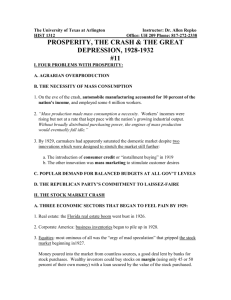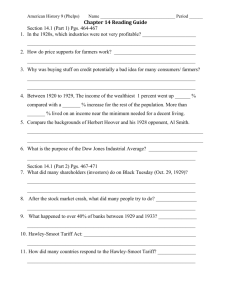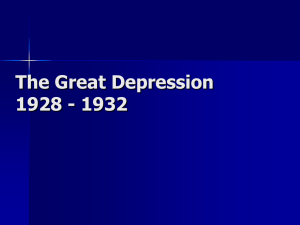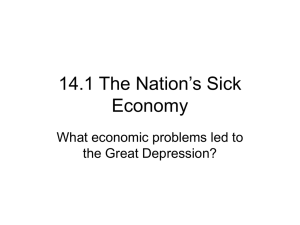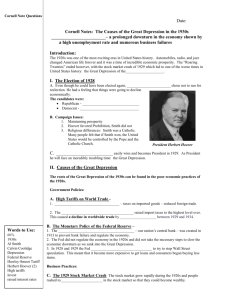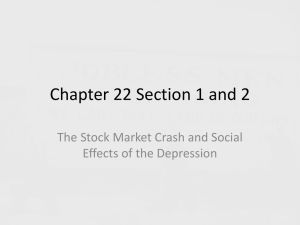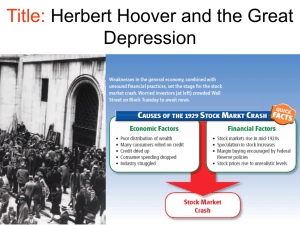File - US History With Ms. Squires
advertisement
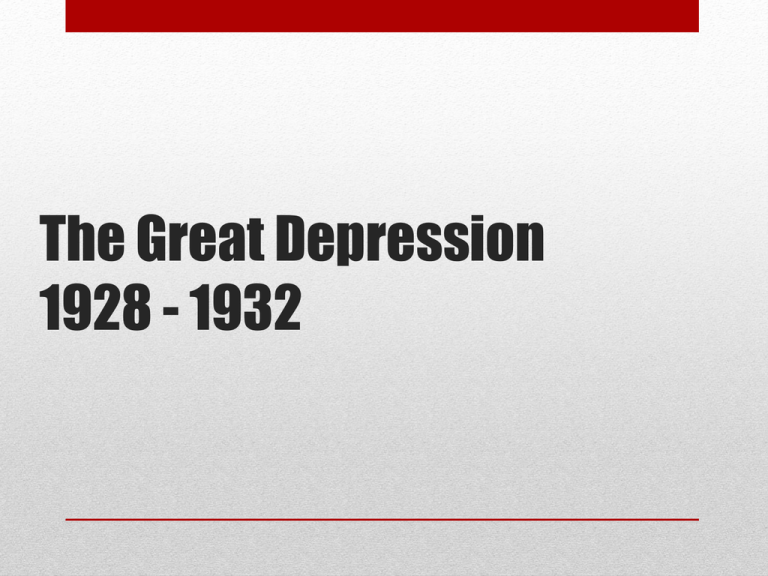
The Great Depression 1928 - 1932 Causes of The Great Depression Intro Video 1. Uneven Distribution of Wealth • Workers output increased 32%, wages increased 8% • Corporate profits increased 65% • 60% of families earn less than $2,000/yr. • The wealthy minority did not buy enough to keep the economy going 2. Easy Credit • People accumulated more and more debt each year • 80% of all radios and 60% of all cars purchased were bought using credit 3. Stock Speculation/ Crash • Soaring stock prices were based on confidence rather than reality of profits • Investors continued to buy on margin • These led to the Stock Market Crash Stock Market Crash • October 23, 1929 – Dow Jones drops 21% in 1 hour • October 24, 1929 – Black Thursday, Investors lost confidence and began to sell • October 29, 1929 – Black Tuesday, the Stock Market Crashed when over 16 million shares of stock were sold that day • From 1921 to 1929, the Dow Jones rocketed from 60 to 400 • In October 1929, the Dow sank from 400 to 145 • $140 billion of depositor money disappeared because banks had invested depositors money in stocks • The Dow Jones finally surpassed its 1929 high, a full 26 years later in 1955. • By October 27, 1929 RCA was trading at $58.50 per share when the first wave of selling on “Black Monday“, October 28, 1929 brought the shares down ($18.375) to close at $40.25 per share on the day. By August 11, 1932, RCA was trading at $8.875 and hit a 1932 low of $2.50 per share • Stock prices on Sept. 3, 1929, Oct. 29, 1929 and Nov. 15, 1929 • General Electric- $396.25, $210.00, $201.00 • Hershey Chocolate-$128.00, $108.00, $68.00 4. Banks Collapse • Depositors rushed to withdraw money from banks • The Fed limited the money supply to discourage lending • Banks did not have sufficient reserves • 1929 – 641 banks failed • 1930 – 1,350 banks failed • 1931 – 1,700 banks failed 5. Tariffs • Hawley-Smoot Tariff 1930 • Extremely high tax imposed on imported goods • Destroyed international trade by closing off markets Congress passed the Hawley-Smoot Tariff to protect American manufacturers from foreign competition. The strategy was a mistake. Other nations retaliated and raised tariffs as well. The resulting drop in world trade only made the glut of American factory and farm products harder to sell. 6. Businesses Close • When businesses closed people lost their jobs • By 1933, unemployment reached 25% • The stock market crash didn’t start the Great Depression by itself. Instead, it quickened the collapse of the U.S. economy. Effects of Great Depression in Rural and Urban Areas • Bread lines were run by Churches and Private Charities Poverty in Rural America • • • • • Crop prices fell Drought in the Great Plains One million farmers lost their farms Some worked as tenant farmers Dust Bowl struck the southern Great Plains Dust Bowl Migration • Dust Bowl Video • Families migrated out of the region to escape the Dust Bowl and depression • Dust Bowl refugees were called “Okies” • Rural to Urban • Went looking for jobs but found none Poverty in America’s Cities • Loss of jobs, wages, and hours cut • Many sold furniture, jewelry to get money • Lost their homes • Moved to Hoovervilles • Shantytowns of shacks built on public land or vacant lots • Used scrap metal, glass, tin, lumber • Used newspaper to keep warm Hoovervilles Hoover’s Response • Voluntarily work toward common goals • Asked business men to keep employment, wages, and prices at current levels • Called for tax reduction, lower interest rate, and create public-works programs • Asked wealthy to give money to charity Volunteerism Fails • Businesses continue to fail and lay off workers • Local governments cannot provide jobs Hoover Creates the RFC • Reconstruction Finance Corporation gives loans to big businesses and banks • Businesses and banks were supposed to hire new employees and give loans to more businesses • This policy is known as Trickle-down Economics • Was this effective? RFC was ineffective • Businesses do not hire workers • Bankers keep money for themselves • Unemployment remains high Bonus Army • WWI veterans marched on Washington demanding their bonus congress had promised them • Congress passed a bill to pay the bonus early • Hoover vetoed it • General Douglass MacArthur and federal troops were called to clear out the Bonus Army • MacArthur used force without Hoover’s permission Hoover’s Success • Boulder Dam (Hoover Dam) • Created much needed jobs in Southwest • Provided electricity and irrigation
